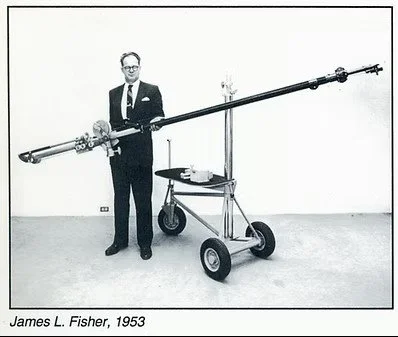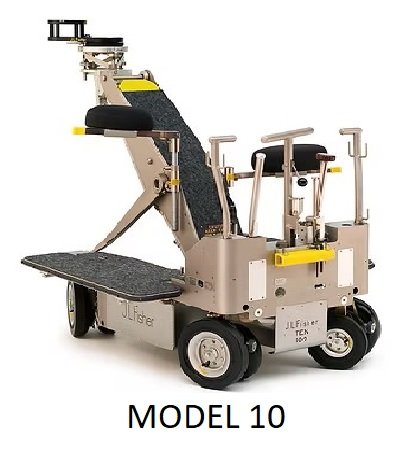The History of j.L. Fisher Camera Dollies
the beginning of a legendary company
Few names in filmmaking gear inspire as much confidence as J.L. Fisher. Founded by James L. Fisher, the company earned its reputation before a single dolly touch-down—by solving sound problems first—and later set the standard for smooth, repeatable camera movement. Today the company is led by Jim Fisher, son of James L. Fisher, continuing a family line of practical engineering for film and television.
From Booms to Dollies: the Early Years (Models 2–7)
Fisher’s origin story starts in sound. In 1951, the company unveiled the 16-foot Model 2 Microphone Boom and Model 3 Base, lighter and more controllable than what studios were used to. By the late 1950s, Fisher introduced the Model 7 Boom with the Model 6 Base for the booming (sorry) world of television stages. These early Models 2–7 were audio boom systems and bases, not camera dollies, but they established Fisher’s DNA: quiet operation, rugged construction, and precise, repeatable control.
Those classic booms are still taught and used today—Local 695 trains operators on Model 2/3 and Model 7/6E systems, a testament to their enduring design.
The First Fisher Camera Dollies
(Model 8 and 9)
Fisher didn’t enter camera movement until 1963, with the first dedicated dolly, the Model 8. The Model 9 (1966) followed quickly and became a favorite for multi-camera television, where tight marks and consistency matter every take. This is where the “Fisher feel” filmmakers talk about—controlled, predictable, quiet—really begins. The Fisher Model 9 refined the company’s first production dolly, the Model 8, with a sturdier chassis, smoother hydraulic boom, and higher payload capacity. While the Model 8 introduced Fisher’s hydraulic lift system and basic three‑wheel steering, the Model 9 became the industry standard for multi‑camera television thanks to its improved stability, four‑wheel steering, and more precise maneuverability.
The Icon: Fisher 10
Introduced in 1982, the Fisher 10 took everything crews liked about the 9 and made it faster, tighter, and more precise. The headline upgrade is round steering—a true circular steering mode added alongside conventional and crab—that lets operators execute smooth arcs, buttonhooks, and wrap moves with repeatable accuracy. The 10 also arrived in a more compact, more maneuverable footprint (the 9 is the largest Fisher dolly), so threading through crowded sets or narrow doorways became less of a wrestling match. Under the hood, the 10’s refined hydraulics and control feel deliver silkier starts and stops, better micro-adjustments on marks, and the kind of consistency you need on multi-take blocking. Those improvements, plus a deep accessory ecosystem, are why the Fisher 10 became the industry standard—and why it earned Academy Sci-Tech recognition soon after.
Compact & Capable: Fisher 11
Introduced in June 1994, the Fisher 11 keeps the same Fisher DNA—three-way steering (conventional, crab, and round), smooth hydraulics, and that trademark “Fisher feel”—but in a lighter, more compact footprint. Compared with the Fisher 10, the 11 is quicker to place and excels on tight sets, narrow hallways, and practical locations where fast resets matter. You’re not giving up move vocabulary: both 10 and 11 deliver precise arcs and repeatable marks; the difference is emphasis. The 10 has a touch more platform and mass, which many operators prefer for long, silky hero moves where inertia helps the shot. The 11 is the agile problem-solver when space is the constraint or company moves are frequent. Both share the familiar Fisher ecosystem—track, seats, and accessories—so your package scales up or down without drama.
Why Crews Still Ask for Fisher
Fisher dollies are built for repeatability—you can hit the same mark, the same way, all day. They’re quiet (a heritage from the boom-mic era) and operator-first with steering that behaves, brakes you trust, and quick wheel changes. Add their longevity and factory support—Fisher still maintains its classic gear—and you get tools crews rely on for years.
renting fisher dollies in nashville, tn
Keep logistics simple with Citation Support—your one-stop shop for camera dolly rental in Nashville, TN. We’re the only place in town with the Fisher Model 10, and we also stock the Fisher Model 11, both available as complete packages (track, seat mounts, accessories) tailored to features, series, and commercial shoots. Beyond dollies, we rent lighting, grip gear, production supplies/expendables, and radios, so you can book everything in one order with coordinated pickup or delivery. If you’re searching for Fisher 10 rental Nashville, Fisher 11 rental Nashville, or film equipment rental Nashville, start here.
or call (615) 298-5252







